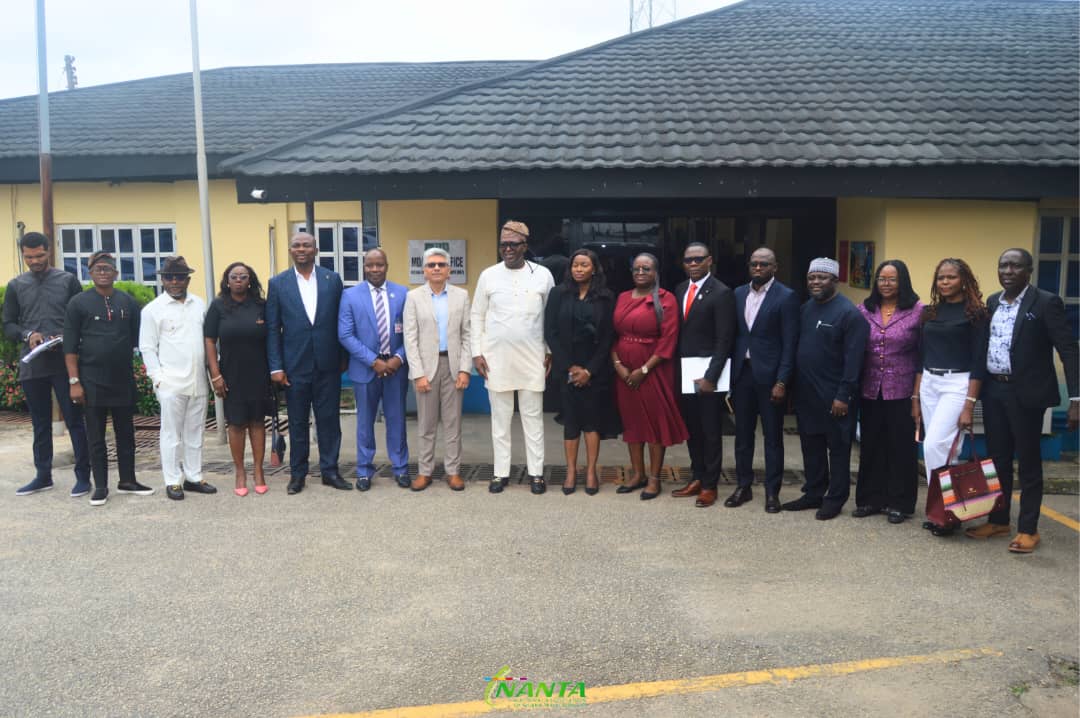Metro
Nigeria Airports Will Mirror a New Nigeria – FAAN MD, Kuku

The Managing Director, Federal Airports Authority of Nigeria ( FAAN), Mrs Olubunmi Oluwaseun Kuku, has said that the deliberate transformations ongoing at Nigerian Airports are geared towards enhancing passengers experience and boosting a positive image of Nigeria.
According to the FAAN boss who spoke during a courtesy visit to her office by the Yinka Folami led executive Council of National Association of Nigeria Travel Agencies (NANTA), Monday, July 29th,2024, the key transformation ecosystem also consist of the zero tolerance against activities inimical to passengers safety, particularly harassment of passengers and touting within and around airports vicinities.
She commended NANTA’s strategic advocacy for fair play in the aviation sector, promising to collaborate with registered travel trade professionals who are members of NANTA.
“We are willing to work with your association to address the concerns you have raised and also strengthen the bond of partnership between FAAN and NANTA for a better and secured environment for all stakeholders in the airport community ” Mrs Kuku further explained.
On the request for a space for a dedicated NANTA Help Desk at the airports across the country for travellers awareness and information sharing, Mrs Kuku stated that the request is critical to impacting the ongoing transformation at the airport and urged NANTA to submit names of its members who shall work closely with the FAAN protocol unit.
” We welcome your ideas and collaboration which will improve the quality of passenger service, provide accurate travel information, ambush misinformation and also help to identify and eliminate touting at the airports, Mrs Kuku added, further directing the NANTA leadership to engage FAAN Director of Special Duties and the Public Relations Department to immediately work modalities for collaboration.
” We are working hard to streamline airport transfer services and enhance traveller convenience. We acknowledge certain challenges such as ticket racketeering, especially at the domestic wing and loitering of unauthorised persons around airport premises. There’s also the collusion between some airline staff and ticket rocketeers, which fuels the unauthorised sale of tickets of no-show passengers under different names. All these we intend to tackle in partnership with the Federal Ministry of Aviation and Nigeria Civil Aviation Authority (NCAA)” FAAN boss informed.
Speaking earlier, NANTA President, Mr Yinka Folami who was accompanied by the Second National Deputy President, Dr Dagunduro Olatokumbo , Yinka Olapade, Vice President, Lagos Zone, Adekunle Oluwole, Tressurer, Lagos Zone, Mrs Yewande Philip-Ogunbiyi, Publicity Secretary, Lagos Zone, Mrs Oluwatoyin Ojo, Internal Auditor Lagos Zone, Mr Obasa Oyebola, Publicity Secretary, Western Zone, Member Representatives, Mr Vinod Kaurani, Mr ThankGod Oganwo, and Mr Stanley Diagi, NANTA Administrative Officer, commended the transformation of the airports under Mrs Olubunmi Oluwaseun Kuku and requested for strategic partnership and collaboration with FAAN to enthrone a system clean up, eliminate touting, and enthrone seamless passenger transfer services.
” We at NANTA are impressed with your work ethics and particularly on the transformation of our airports, which is an added premium value to marketing Nigeria to the world. In this regard to help passengers access information, we request for a NANTA dedicated pavilion at our airports across the country. We are also concerned about touting by unauthorised persons around airports vicinities and wish to see airlines mandated to establish proper queue lines to help improve orderliness at check-in counters” NANTA President noted.
Mr Yinka Folami also sought a plank for continuous engagement to enhance inbound and outbound traveller experience and satisfaction when accessing Nigerian airports.
Metro
Alleged $510,000 Fraud: Bank Reports Ex-Staff to EFCC

The Economic and Financial Crimes Commission (EFCC) has arraigned a former bank staff member, Obinna Nwaobi, before the Federal High Court in Enugu over the alleged criminal diversion of a customer’s $510,000.
Nwaobi was brought before Justice C.O. Ajah on a seven-count charge bordering on obtaining money by false pretence, fraudulent conversion, and stealing.
The EFCC said he abused his position as a banking officer to illicitly divert funds entrusted to him by a customer.
According to the charge, Nwaobi allegedly received the sum of $510,000 from a customer under the guise of helping to manage and invest the funds but dishonestly converted the money to his personal use.
The offences, the Commission noted, violate Section 1(1)(a) of the Advance Fee Fraud Act 2006 and Sections 342 and 343 of the Criminal Code Law of Enugu State.
The Commission stated that the alleged fraud was uncovered after the new generation bank where Nwaobi previously worked detected suspicious transfers linked to him.
An internal review reportedly confirmed the irregularities, prompting the bank to escalate the matter to the EFCC, which then opened a full-scale investigation leading to his arraignment.
A senior compliance officer of the bank explained that strengthened surveillance systems and routine monitoring helped detect the suspicious transactions early.
The bank, he said, remains committed to sanitising the financial sector by reinforcing its anti-fraud unit and investing in advanced tools that track unusual account activities in real time.
The bank reaffirmed its collaboration with law-enforcement agencies to ensure that any staff member involved in fraudulent activity is promptly identified and prosecuted as part of wider efforts to protect customer funds and bolster public confidence in the banking system.
Nwaobi pleaded not guilty to all charges. Following his plea, the prosecution counsel requested a trial date and asked the court to remand the defendant.
Justice Ajah ordered that he be remanded at the Enugu State Correctional Facility pending the determination of his bail application and adjourned the matter for further hearing.
Metro
The Architectonics of Influence: Leadership, Power, and Deliberate Pursuit of Possibilities

By Tolulope A. Adegoke, PhD
“Leadership envisions the future, Power builds it, but only Control ensures it endures. In their deliberate synergy lies the architecture of all human progress,” – Tolulope A. Adegoke, PhD
Introduction: The Tripartite Foundation of Progress
At the heart of every significant human achievement—from the ascent of a thriving corporation to the resilience of a prosperous nation and the self-actualization of an individual—lies the potent interplay of three fundamental forces: Leadership, Power, and Control.
These concepts are often conflated or misunderstood. Yet, their distinct roles and synergistic relationship form the very bedrock upon which possibilities are envisioned and delivered. Leadership provides the vision and the compass; power furnishes the engine and the tools; and control ensures the steering and the governance. Together, they create an “architectonics of influence,” a deliberate framework for building a better future across all sectors of human endeavor.
Deconstructing the Core Concepts
- Leadership: The Compass of Purpose
Leadership is not merely a position; it is a process of social influence that maximizes the efforts of others toward achieving a goal. It is the domain of vision, inspiration, and emotional intelligence.
- For Peoples: Leadership manifests as mentorship, parenting, and community organizing. It empowers individuals to transcend their limitations, fostering personal growth, resilience, and a sense of agency.
- For Corporates: Leadership sets the strategic direction, cultivates culture, and inspires innovation. It is the force that aligns diverse talents toward a common mission, navigating market volatility and competitive pressures.
- For Nations: Leadership, at its best, articulates a national destiny, unites citizens around shared values, and steers the country through crises and opportunities on the global stage.
- Power: The Currency of Action
Power is the capacity to influence the behavior of others or the course of events. It is raw potential energy that, in itself, is neutral—its morality defined by its application. French and Raven’s classic bases of power provide a useful lens:
- Coercive & Reward Power: (Sticks and Carrots) Effective in the short term but often unsustainable, as they rely on external compliance rather than internal commitment.
- Legitimate Power: Derived from a formal position or title (e.g., CEO, Prime Minister).
- Expert Power: Granted based on knowledge, skills, and competence.
- Referent Power: The most potent form, earned through charisma, respect, and admirable qualities.
- Control: The Rudder of Stewardship
Control represents the systems, processes, and ethical frameworks that guide the application of power. It is the essential counterbalance that prevents power from becoming corrupt, arbitrary, or inefficient. Control is not about restriction, but about direction and stewardship.
- Mechanisms of Control: These include transparency, accountability, checks and balances, legal and regulatory frameworks, ethical codes of conduct, and performance metrics.
The Synergistic Equation: Leadership + Power + Control = Delivered Possibilities
The true impact occurs when these three elements are harmonized. Leadership without power is impotent; power without leadership is directionless; and both without control are dangerous.
The Formula for Impact: A visionary leader (Leadership) must wield appropriate forms of power (e.g., Expert and Referent) to mobilize resources and people. This application of power must then be channeled through robust control mechanisms to ensure it is effective, ethical, and aligned with the overarching goal. This synergy unlocks possibilities.
The Perils of Imbalance:
- Leadership without Power: The inspiring visionary with no authority or resources becomes a frustrated prophet, their ideas never materializing.
- Power without Leadership: The powerful but visionless authority figure (a tyrannical manager, a despotic ruler) creates chaos, stifles innovation, and leads to oppression or organizational decay.
- Power without Control: This is the definition of tyranny and corruption. It leads to the abuse of resources, the suppression of dissent, and ultimately, systemic failure (e.g., corporate scandals, state collapse).
Delivery Across Sectors: Peoples, Corporates, and Nations
- For Peoples: The Realm of Personal and Community Agency
- Leadership: Self-leadership—taking responsibility for one’s own growth and actions. Community leaders articulate a shared vision for neighborhood improvement.
- Power: The power of knowledge (Expert), the power of a strong network (Referent), and the collective power of organized action.
- Control: Personal discipline, ethical codes, and community-agreed rules of engagement.
- Delivered Possibilities: Empowered individuals achieve self-actualization. Cohesive communities solve local problems, foster social capital, and create environments where people can thrive.
- For Corporates: The Engine of Innovation and Value Creation
- Leadership: The CEO and C-suite set a compelling vision and culture. Middle managers translate strategy into action and empower their teams.
- Power: Legitimate power of hierarchy, expert power of specialized teams, and the referent power of a strong brand and respected leadership.
- Control: Corporate governance, board oversight, compliance departments, performance management systems, and a strong ethical culture.
- Delivered Possibilities: Sustainable profitability, market innovation, employee engagement and well-being, and long-term value for all stakeholders.
- For Nations: The Framework for Collective Prosperity and Stability
- Leadership: Elected officials, civil servants, and a judiciary that provide direction, uphold the law, and steward national resources.
- Power: The sovereign power of the state, derived from the consent of the governed (Legitimate), and exercised through institutions (military, judiciary, executive).
- Control: The Constitution, separation of powers, an independent judiciary, a free press, transparent elections, and anti-corruption watchdogs.
- Delivered Possibilities: Economic development, social justice, national security, public health, and the preservation of fundamental rights and freedoms—the foundation for a flourishing society.
The Indispensable Role of Control: From Stewardship to Possibilities
Control is the often-overlooked hero in this narrative. It is the difference between a dictator and a statesman, between a reckless conglomerate and a sustainable enterprise.
- Control Fosters Trust: Transparent and accountable systems build trust among citizens, employees, and investors, which is the currency of long-term collaboration.
- Control Enables Scalability: Without control mechanisms, organizations and nations cannot grow beyond a certain size without descending into inefficiency or chaos.
- Control Mitigates Risk: It provides the early warning systems and corrective actions that prevent catastrophic failures.
- Control Ensures Legitimacy: Power is seen as legitimate and worthy of support when it is exercised within a known and fair framework.
Conclusion: The Call for Conscious Stewardship
In a world of increasing complexity and interconnectedness, the deliberate and ethical management of leadership, power, and control is not a theoretical exercise—it is a practical imperative.
The ultimate delivery of possibilities—be it a child reaching their potential, a corporation pioneering a world-changing technology, or a nation achieving lasting peace and prosperity—rests on our collective ability to:
- Cultivate Leaders who are not only visionary but also humble, ethical, and empowered by referent and expert power.
- Wield Power consciously, recognizing its sources and its profound responsibility.
- Design and Uphold Control systems that are robust yet adaptable, ensuring that power is always a force for creation, not destruction.
The future does not simply happen; it is built. It is architected by those who understand that true, lasting power is the capacity to unlock human potential, and that the highest form of leadership is the stewardship of possibilities for all.
Dr. Tolulope A. Adegoke, AMBP-UN is a Doctor of Philosophy (PhD) in History and International Studies, Fellow Certified Management Consultant & Specialist, Fellow Certified Human Resource Management Professional, a Recipient of the Nigerian RoleModels Award (2024), and a Distinguished Ambassador For World Peace (AMBP-UN). He has also gained inclusion in the prestigious compendium, “Nigeria @65: Leaders of Distinction”.
Metro
APC’s Joe Igbokwe Calls for Dismissal of Soldier Who Stood His Ground Against Wike

A member of the All Progressives Congress (APC), Joe Igbokwe, has called for the dismissal of the soldier who resisted the Minister of the Federal Capital Territory, Nyesom Wike.
The soldier had blocked Wike and officials of the FCTA from accessing a portion of land in the FCT.
The officer, claiming he was acting on instructions, told Wike that he would not be allowed into the property. Wike, however, questioned his authority, leading to a heated confrontation and name calling.
Reacting on Facebook, Igbokwe questioned who was behind the military officer in challenging the FCT Minister.
He wrote, “Who is this man in uniform? Of what meat is he fed? Who is beating the drum for him? This is unacceptable? His uniform has to be removed.”






